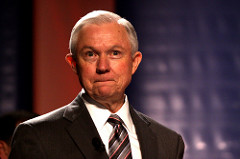Taxpayers Protection Alliance Condemns RAWA
Another group, or at least the leader of said group, has come out against Sheldon Adelson’s Restoration of America’s Wire Act (RAWA). In an op-ed this week for The Daily Caller (yes, I know, but sometimes I have to visit garbage sites for work), David Williams, the President of the Taxpayers Protection Alliance (TPA), called RAWA “a deeply flawed, dishonest piece of legislation.”
Williams framed his argument around a recent meeting that Nevada Governor Brian Sandoval (who was also once chair of the Nevada Gaming Commission) had with United States Attorney General Jeff Sessions. Sessions is a known opponent of online gambling, telling Senator Lindsey Graham during his (Sessions’) confirmation hearing that he was “shocked” at the Office of Legal Counsel’s (OLC) 2011 clarification that the Wire Act applied only to sports betting and that he would “revisit” the ruling when he was in office.

Sen. Jeff Sessions
Photo credit: Gage Skidmore via Flickr
RAWA, as readers of this site know, is a piece of legislation put forth by Adelson and his people attempting to codify the incorrect interpretation of the Wire Act that had been used up until the OLC’s clarification. That incorrect interpretation was that all online gambling was illegal, not just sports betting. Thus, Adelson and his supporters, including Sessions and Rep. Jason Chaffetz – the two men who introduced RAWA into Congress – essentially want a lie made into law.
“The legislation is flawed,” wrote Williams, “because it would lead to a crackdown of online gambling by Sessions and other law enforcement for no good reason. Americans by and large are OK with legal gambling as long as it is reasonably regulated. Online gambling hosted in states that allow it is hardly the Wild West.”
He continued:
That doesn’t stop RAWA’s sponsors such as outgoing Congressman Jason Chaffetz (R-Utah) from saying some frankly absurd things about gaming in America. For instance, he frets on his website that a decision by Justice Department “unleashes the potential for an unregulated gambling industry to be imposed nationwide,” when it is clear as the high noon sun that it’s done no such thing.
Not only has it done no such thing, but it also makes no sense. The OLC’s clarification of the Wire Act didn’t strip all laws regarding online gambling. It just said that only online sports betting is specifically disallowed by the federal Wire Act. It confirmed that states could create their own regulations and legalize online gambling within state borders. Thus, the Wire Act did the opposite of what Chaffetz feared – it unleashed the potential for a regulated gambling industry to be imposed nationwide.
Unfortunately, only three states have regulated online gambling so far, but that’s besides the point.
Williams goes on to criticize RAWA supporters further:
Chaffetz asserts that administrations “from both parties have held that the federal Wire Act bars Internet gambling.” He seeks to cement that impression by again asserting that this “position has enjoyed bipartisan support from the public, their representatives and from attorneys general of most states.”
Pardon my French but oh balderdash. The Wire Act, coming well before the Internet, needed to be updated to apply it to all online gambling. Congress refused to do so, many times. The Justice Department eventually realized it was on very shaky legal ground and so sensibly backed off.
Williams concludes by referencing a letter written by the National Governors Association to Attorney General Sessions in which the governors said that the decisions regarding online gambling should be left up to the states themselves and that a federal ban “drives this activity offshore to unregulated jurisdictions, out of reach of state and federal law enforcement and with risk to consumers.”
The Taxpayers Protection Alliance describes itself as such:
The Taxpayers Protection Alliance (TPA) is a non-profit non-partisan organization dedicated to educating the public through the research, analysis and dissemination of information on the government’s effects on the economy. TPA, through its network of taxpayers will hold politicians accountable for the effects of their policies on the size, scope, efficiency and activity of government and offer real solutions to runaway deficits and debt.
The TPA was part of a coalition of conservative and libertarian organizations that joined together to write to Vice President-Elect Mike Pence and then-Senator Sessions in January, urging them not to support RAWA. Among other points, the coalition said:
There is also little to no evidence to support state AGs’ claims that instituting gambling bans would affect rates of suicide or divorce—an argument that is nothing more than a red herring. Researchers have shown that gambling on the Internet is no more addictive than gambling in a casino, greater access to gambling doesn’t increase addiction rates, and disordered gambling is almost always expressed with, and often after, a person displays other addictive behaviors. On the black market, identifying and helping those experiencing or at risk for disordered gambling is nearly impossible.
Politics can make for some strange bedfellows. While I feel many of the TPA’s views are horrible, I certainly side with the organization on this one.

















COMMENTS